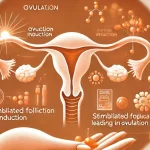As an expectant parent, you have a lot to deal with and the care for your unborn child is of course the top priority. One of the topics that raises many questions and sometimes also concerns is premature birth. Premature contractions can come on suddenly and what does that actually mean? In this article we would like to tell you everything you need to know about early contractions and premature birth. Whether you're just pregnant, have everything else going on in your pregnancy, or simply want to know more, we're here to inform and reassure you. Read along with us and discover what early contractions are, what you can do when they occur and how you can make your pregnancy go as smoothly as possible.
Premature contractions
At Midwives Lelystad we understand how exciting and stressful it can be when you have to deal with early contractions. These contractions of your uterus can be a sign that your body is preparing for a premature birth. Often this is due to multiple causes, as:
-
- Infections
-
- Abnormalities in the uterus
-
- Too much amniotic fluid
-
- Problems with the placenta
Althoughthis can be scary, there arefortunate ones too many methods that you can try to keep the situation under control. For example, by resting regularly, staying hydrated, and avoiding tension, you can reduce the chance of premature labor. reduce significantly. In addition, it may be useful to quickly contact one of our expert midwives for personalized advice and the right care. Attention is essential, especially if you notice the following symptoms:
| Symptom | Action |
|---|---|
| Regular contractions | Contact your midwife |
| Pain in the lower back | Restand stay hydrated |
| Leakage of amniotic fluid | Go to the hospital immediately |
By staying alert and taking the right steps, you can contribute to a healthy pregnancy and reducing the risk of premature birth. Do you have questions or concerns? Please feel free to contact Midwives Lelystad for personal advice and support.
Premature rupture of membranes
When your water breaks prematurely, it can be shocking and raise many questions. It is important to know what this means for you and your baby and what steps you can take. The most important risks are infections and premature birth. That's why you better be well prepared if you find yourself in this situation. Your midwife will often choose to have you checked out in hospital so that the health of you and your baby can be closely monitored. Remember that it is essential to always contact a healthcare provider immediately if you suspect that your water has broken.
There are some common signs that your water has broken before 37 weeks pregnancy. These can vary and it is useful to recognize them:
-
- A sudden flow of fluid from you vagina
-
- Constant dripping moisture
-
- Reduction of the pressure in your abdomen
If you notice any of these signs, follow these steps:
-
- Stay calm and try to relax
-
- Call you immediately midwife or the hospital
-
- Note the time you noticed the fluid loss and the color of the fluid
Risk factors for premature delivery
Several factors can increase the risk of premature labor and delivery. Some of these are out of your control, such as genetics or a premature birth in your family. However, other factors can be managed and adjusted for a healthier pregnancy.
Here are some important risk factors to keepin mind:
-
- Smoking: Tobacco use can negatively affect your baby's development and increase the risk of premature birth.
-
- Multiple births: Twins or multiples carry increased risks for premature contractions.
-
- Medical history: Chronic conditions such as diabetes or high blood pressure can cause complications.
-
- Stress: Extreme stress or heavy physical labor can cause excess pressure.
| Risk factor | Influence |
|---|---|
| Low birth weight | Increased risk of premature birth |
| Medical procedures such as IVF | More risk of premature contractions |
Our midwives at Midwives Lelystad are experts in supporting expectant mothers. Together we can intervene in time and take precautions to ensure a healthy and safe pregnancy.
Treatment of a threatened premature birth
When you are dealing with premature labor, it is important to take action immediately. There are several ways in which practitioners can tackle a threatened premature birth to ensure the health of both mother and baby. Major treatment options include:
-
- Medication Administration: Doctors can administer medications to slow down contractions and help the baby's lungs mature more quickly.
-
- Bed rest: Advising bed rest to reduce pressure on the uterus and prevent premature delivery.
In addition, hospitalization may be necessary, especially if the preterm birth is more advanced. Specialists keep a close eye on the condition of mother and child. A consultation with a neonatologist can also take place to make a plan for care after birth.
| Intervention | Goal |
|---|---|
| Medication administration | Lung maturation of the baby, inhibit contractions |
| Bed rest | Preventing premature delivery |
| Hospitalization | Intensive monitoring |
The sooner the treatment starts, the better the outcome for both mother and child. That's why it's crucial to contact your midwife immediately if you notice any signs of preterm labor. Together we can always find the best possible approach. At Midwives Lelystad we are ready to support you every step of the way.
Anti-contractile medications
When preterm labor occurs, a doctor may choose to prescribe. These medications, also known as tocolytics, aim to reduce contraction activity or even stop it completely. This gives the unborn child more time to develop further in the womb, which can be crucial for lung maturation and other vital organs. Tocolytics used are often atosiban, nifedipine and indomethacin. Each of these medications comes with its own benefits and potential side effects, so it is important that their choice is carefully tailored to the pregnant woman's specific situation.
Even though these medications can be effective in prolonging pregnancy, they do not guarantee completely delaying labor. That is why Midwives Lelystad advises to always be prepared and to consider alternative means of support. These may include:
-
- Adjustments to the diet to improve overall health and resistance.
-
- Sufficient rest and stress reduction;
-
- Regular check-ups and follow-ups with your obstetrician or gynecologist.
Below you will find a simple overview of some commonly used tocolytics and their functions:
| Medicine | Function |
|---|---|
| Atosiban | Inhibits oxytocin, reduces contractions |
| Nifedipine | Calms muscle contractions |
| Indomethacin | Reduces prostaglandins, reduces contractions |
Corticosteroids
-
- Accelerates lung development
-
- Reduces risk of complications
-
- Fast administration with noticeable effects
| Medication | Operating time | Advantages |
| Dexamethasone | 24-48 hours | Rapid lung maturation |
| Betamethasone | 24-48 hours | Reduces lung complications |
Although they play a strong role in promoting lung maturation, there are also some side effects to be aware of. You may experience a temporary increase in blood sugar levels or increased blood pressure. Therefore, it is important that administration and dosage are accurately monitored by a healthcare professional. Midwives Lelystad is ready to support you and answer all your questions.
If the birth continues
When the contractions become stronger and more regular, it is clear that your labor is progressing. At this moment it is important to remain as calm as possible and contact your midwife. BeeMidwives Lelystad We recommend that you think about how you get to the hospital. Make sure that your partner or a supervisor is ready to support you during this exciting moment. Don't forget to have your bag of essential items at hand.
-
- Stay calm: Try to relax and apply regular breathing techniques.
-
- Call midwife: Contact your midwife immediately for guidance.
-
- Hospitalization: Make sure your transportation is arranged.
-
- Bag ready: Think about things like clothes, toiletries, and you birth plan.
If the baby arrives earlier than expected, medical support is often necessary. In the event of premature birth, the hospital can provide specific care to you and your baby. This can vary from extra monitoring to specialized neonatal care. Below you will find a brief overview of what you may encounter:
| Concern | Description |
|---|---|
| Monitoring | Frequent check-ups of you and your baby. |
| NICU | Special unit for neonatal care. |
| Support | Emotional and mental support. |
Resume
Thank you for taking the time to read our article on preterm labor and premature birth. At Midwives Lelystad we understand that this can be a worrying topic and we hope that you are now better informed about the signs and what you can do to minimize the risks. Remember that you are never alone; Our team of experienced midwives is ready to support you and answer all your questions. Do you have any specific concerns or would you like to make an appointment to discuss your situation further? Don't hesitate to contact us. Together we work towards a safe and healthy pregnancy for you and your child.








